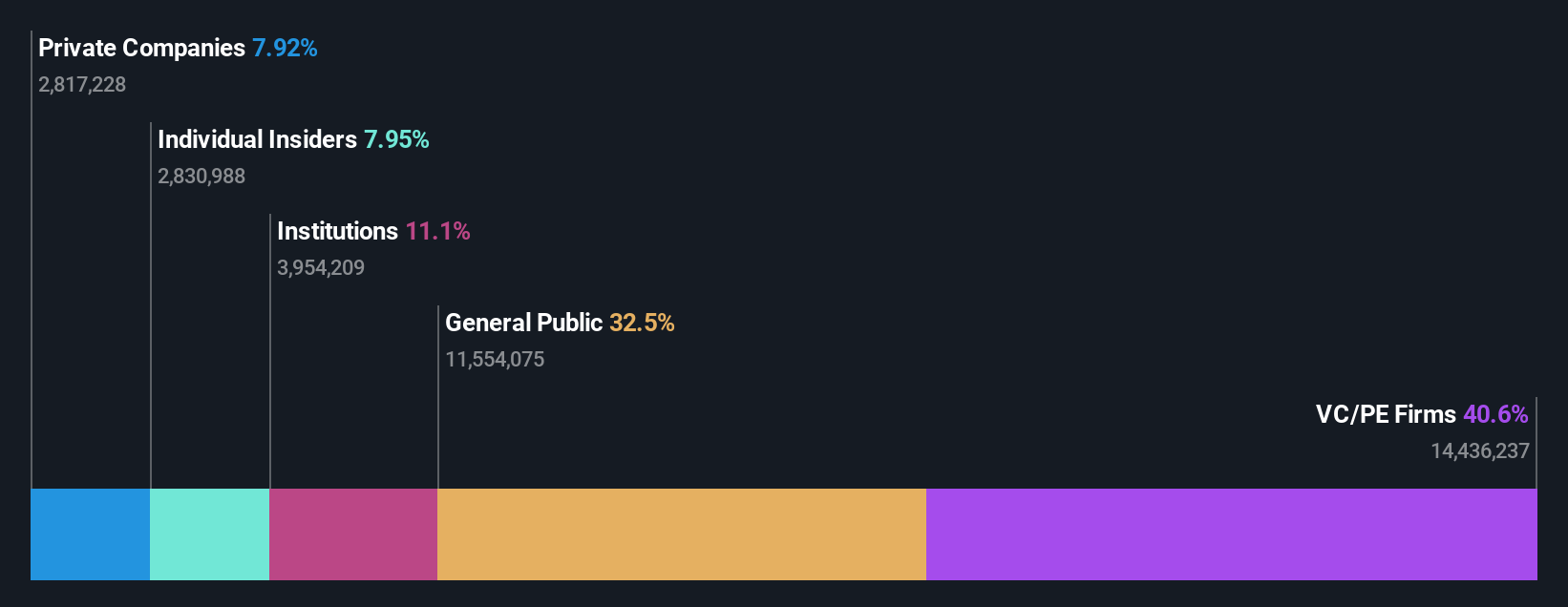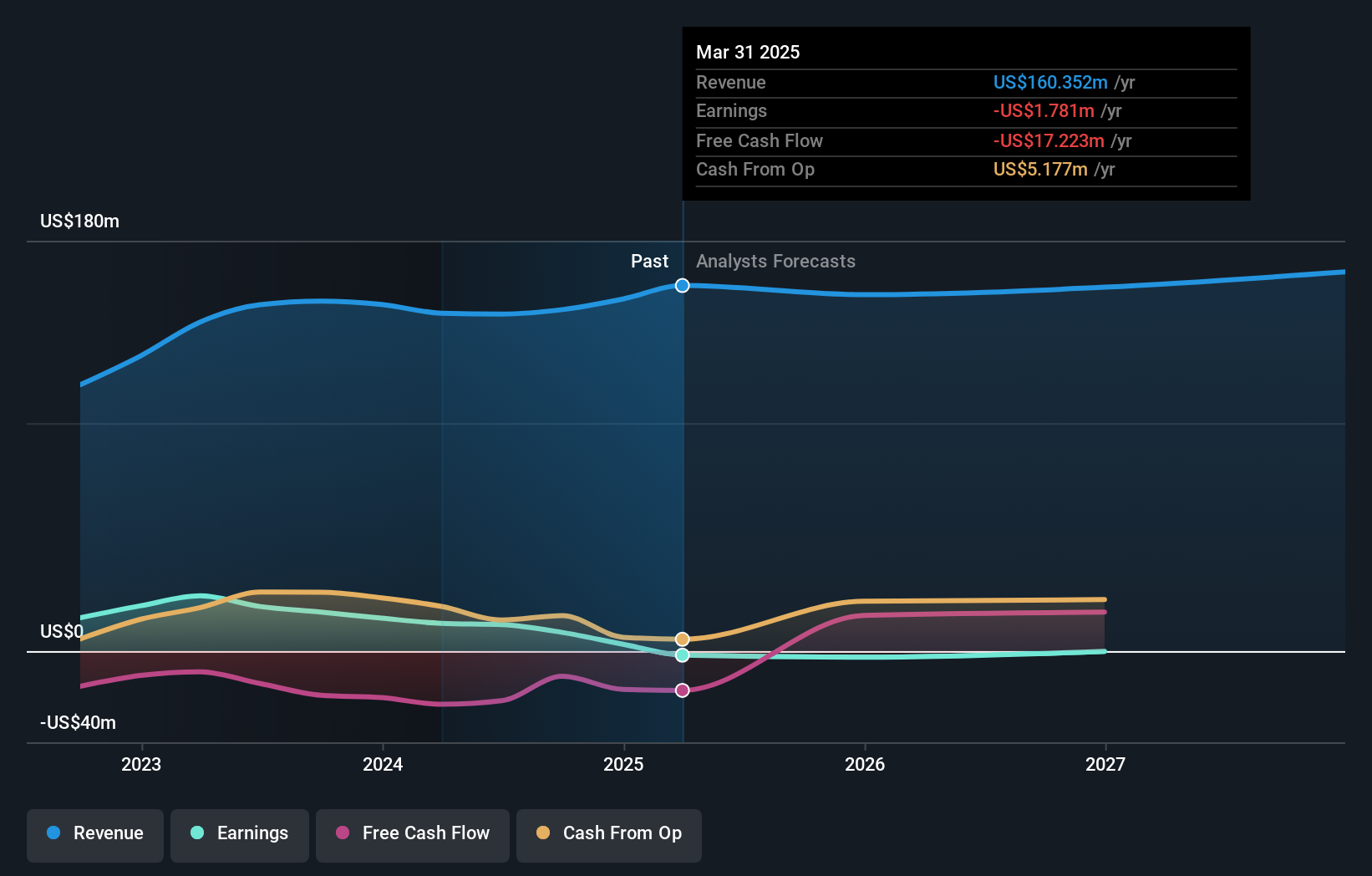- United States
- /
- Energy Services
- /
- NasdaqCM:DTI
Drilling Tools International Corporation's (NASDAQ:DTI) stock price dropped 10% last week; private equity firms would not be happy
Key Insights
- Drilling Tools International's significant private equity firms ownership suggests that the key decisions are influenced by shareholders from the larger public
- 52% of the business is held by the top 3 shareholders
- 11% of Drilling Tools International is held by Institutions
If you want to know who really controls Drilling Tools International Corporation (NASDAQ:DTI), then you'll have to look at the makeup of its share registry. We can see that private equity firms own the lion's share in the company with 41% ownership. In other words, the group stands to gain the most (or lose the most) from their investment into the company.
As market cap fell to US$102m last week, private equity firms would have faced the highest losses than any other shareholder groups of the company.
Let's delve deeper into each type of owner of Drilling Tools International, beginning with the chart below.
View our latest analysis for Drilling Tools International

What Does The Institutional Ownership Tell Us About Drilling Tools International?
Institutions typically measure themselves against a benchmark when reporting to their own investors, so they often become more enthusiastic about a stock once it's included in a major index. We would expect most companies to have some institutions on the register, especially if they are growing.
We can see that Drilling Tools International does have institutional investors; and they hold a good portion of the company's stock. This suggests some credibility amongst professional investors. But we can't rely on that fact alone since institutions make bad investments sometimes, just like everyone does. It is not uncommon to see a big share price drop if two large institutional investors try to sell out of a stock at the same time. So it is worth checking the past earnings trajectory of Drilling Tools International, (below). Of course, keep in mind that there are other factors to consider, too.

Hedge funds don't have many shares in Drilling Tools International. The company's largest shareholder is HEP Partners LLC, with ownership of 41%. ROC Energy Holdings, LLC is the second largest shareholder owning 7.8% of common stock, and Michael Domino holds about 4.1% of the company stock. In addition, we found that R. Prejean, the CEO has 1.2% of the shares allocated to their name.
To make our study more interesting, we found that the top 3 shareholders have a majority ownership in the company, meaning that they are powerful enough to influence the decisions of the company.
While it makes sense to study institutional ownership data for a company, it also makes sense to study analyst sentiments to know which way the wind is blowing. There is some analyst coverage of the stock, but it could still become more well known, with time.
Insider Ownership Of Drilling Tools International
The definition of an insider can differ slightly between different countries, but members of the board of directors always count. The company management answer to the board and the latter should represent the interests of shareholders. Notably, sometimes top-level managers are on the board themselves.
Most consider insider ownership a positive because it can indicate the board is well aligned with other shareholders. However, on some occasions too much power is concentrated within this group.
We can report that insiders do own shares in Drilling Tools International Corporation. In their own names, insiders own US$8.1m worth of stock in the US$102m company. Some would say this shows alignment of interests between shareholders and the board, though we generally prefer to see bigger insider holdings. But it might be worth checking if those insiders have been selling.
General Public Ownership
The general public-- including retail investors -- own 32% stake in the company, and hence can't easily be ignored. This size of ownership, while considerable, may not be enough to change company policy if the decision is not in sync with other large shareholders.
Private Equity Ownership
With a stake of 41%, private equity firms could influence the Drilling Tools International board. Sometimes we see private equity stick around for the long term, but generally speaking they have a shorter investment horizon and -- as the name suggests -- don't invest in public companies much. After some time they may look to sell and redeploy capital elsewhere.
Private Company Ownership
We can see that Private Companies own 7.9%, of the shares on issue. It might be worth looking deeper into this. If related parties, such as insiders, have an interest in one of these private companies, that should be disclosed in the annual report. Private companies may also have a strategic interest in the company.
Next Steps:
I find it very interesting to look at who exactly owns a company. But to truly gain insight, we need to consider other information, too. For example, we've discovered 2 warning signs for Drilling Tools International (1 is potentially serious!) that you should be aware of before investing here.
But ultimately it is the future, not the past, that will determine how well the owners of this business will do. Therefore we think it advisable to take a look at this free report showing whether analysts are predicting a brighter future.
NB: Figures in this article are calculated using data from the last twelve months, which refer to the 12-month period ending on the last date of the month the financial statement is dated. This may not be consistent with full year annual report figures.
New: Manage All Your Stock Portfolios in One Place
We've created the ultimate portfolio companion for stock investors, and it's free.
• Connect an unlimited number of Portfolios and see your total in one currency
• Be alerted to new Warning Signs or Risks via email or mobile
• Track the Fair Value of your stocks
Have feedback on this article? Concerned about the content? Get in touch with us directly. Alternatively, email editorial-team (at) simplywallst.com.
This article by Simply Wall St is general in nature. We provide commentary based on historical data and analyst forecasts only using an unbiased methodology and our articles are not intended to be financial advice. It does not constitute a recommendation to buy or sell any stock, and does not take account of your objectives, or your financial situation. We aim to bring you long-term focused analysis driven by fundamental data. Note that our analysis may not factor in the latest price-sensitive company announcements or qualitative material. Simply Wall St has no position in any stocks mentioned.
About NasdaqCM:DTI
Drilling Tools International
Provides oilfield equipment and services to oil and natural gas sectors in North America, Europe, and the Middle East.
Undervalued with low risk.
Similar Companies
Market Insights
Community Narratives



